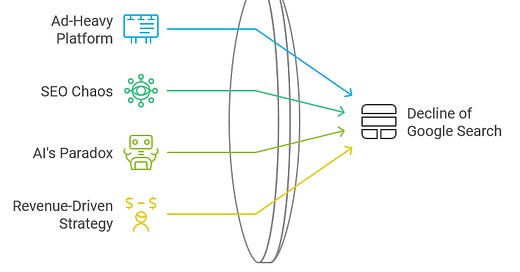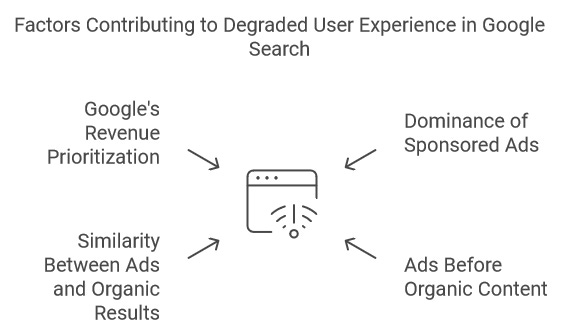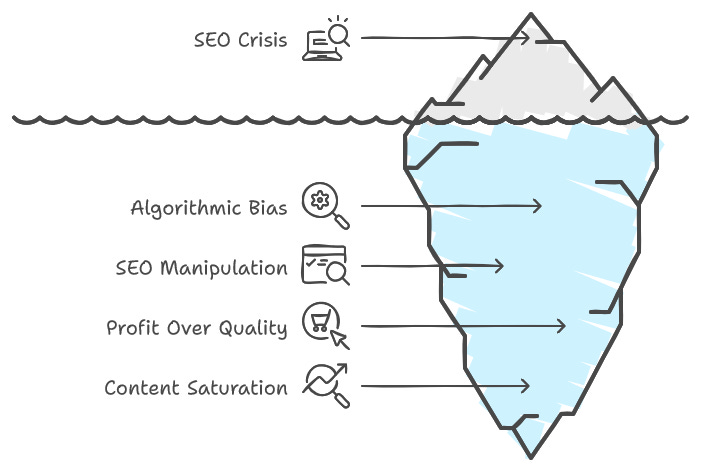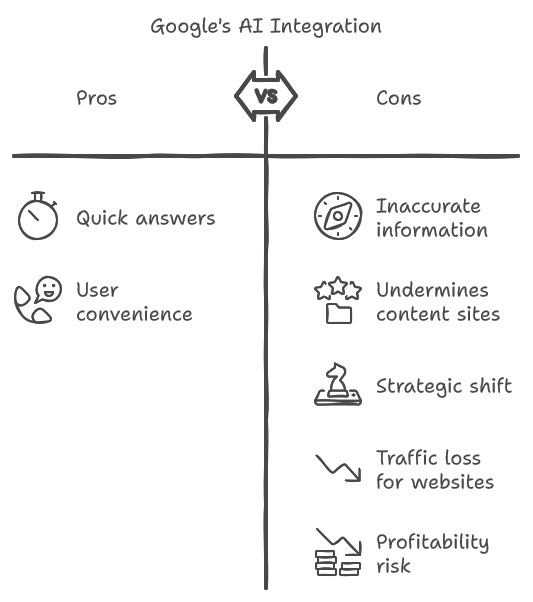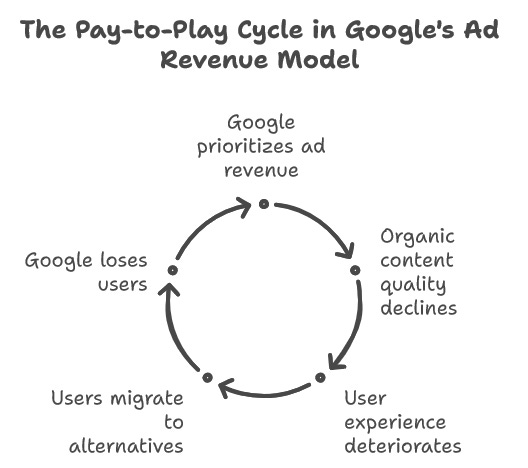Is Google Search Broken? Ads, SEO Chaos, and the AI Paradox Explained
Google Search's Magic Fades: Ads, SEO Tricks, and an AI Takeover. Is This the End of Trust in Google Search?
Google's search experience has been facing a lot of criticism. The core of the search engine that once seemed like magic, offering near-instant answers, is now being questioned. Let’s explore why Google Search is faltering, how SEO is undermining genuine content, and what Google's AI ambitions could mean for the future of search.
1. Google Search: From Magic to Frustration
Google’s search results used to be magical: quick, accurate, and easy to navigate. Today, though, the magic seems to be fading.
The Problem: Sponsored ads dominate the top of the search results. Users now often encounter four ads before seeing any organic content, meaning meaningful results are pushed "below the fold", a reference to newspapers where the best content is always displayed above the fold for visibility. Not only that, but sponsored ads now look almost identical to organic results, with only a tiny disclaimer, making it harder for users to distinguish between genuine and paid placements.
Why It Matters: This shift indicates that Google may have prioritized revenue over user experience. The line between ads and authentic information is blurring, and Google’s focus appears to be on maximizing how much time users spend navigating ads, rather than quickly delivering the answer they need.
💡 Key Insight: Google's current approach is creating a pay-to-win environment, where companies willing to pay for ads enjoy superior visibility. The organic results, meanwhile, suffer, and so do the users seeking authentic information.
2. SEO: The Double-Edged Sword
Search Engine Optimization (SEO) has become a massive industry, fundamentally altering how websites create content.
The Problem: SEO practices have led to content that is often optimized not for humans, but for Google's ranking algorithms. Articles are filled with buzzwords and irrelevant details simply to capture more search queries. This is why recipes, for example, often start with irrelevant life stories before getting to the ingredients. It’s also why many articles that claim to be the "best products of 2024" are simply recycled content from previous years with minor tweaks.
Why It Matters: SEO practices have led to an environment where quality content that doesn't conform to these "optimization tricks" gets buried under masses of clickbait and affiliate-driven articles. Genuine sites, like small-scale review blogs that conduct actual testing, struggle to compete against large platforms with optimized but unhelpful content.
💡 Key Insight: SEO has led to a vicious cycle where content quality decreases while clicks increase. Google’s algorithm often misinterprets time spent on a page filled with ads as user satisfaction, further amplifying low-quality content.
3. Google's AI Integration: Making Things Worse?
Google's use of generative AI for search has introduced a new set of challenges.
The Problem: The increasing presence of AI-generated answers: AI overviews at the top of search results is being promoted as a quick solution. However, these overviews are often inaccurate, filled with "good enough" but not perfect information. This is not just a technological glitch as it represents a strategic shift where Google wants users to stay within Google's own domain, reducing the need to visit other websites that originally produced the content.
Why It Matters: If Google succeeds in creating AI responses that meet user needs entirely, it risks replacing the very websites that feed its AI in the first place. Websites that gather, research, and publish content are essential to Google, yet the integration of AI might undermine their traffic and profitability leading to a paradox where Google is effectively undercutting its content suppliers.
💡 Key Insight: The evolution of Google into an AI-powered answer machine risks transforming it into a closed ecosystem. This could lead to a future where external websites see significantly reduced traffic, and Google's control over what users see is stronger than ever.
4. Google’s Business Model: Paying for Prominence
Google's shift in focus isn’t accidental. It’s a result of its revenue model.
The Numbers: Google made $84.74 billion in revenue in Q2 2024, with 76.3% coming from ads. Ads on Google Search accounted for the majority of this revenue, even surpassing YouTube ads. Google has little incentive to improve organic search results when its profit margins rely so heavily on paid placements.
The Consequences: Google's strategy seems to be shifting from enhancing user experience to enhancing advertiser satisfaction. The goal appears to be keeping users on Google’s pages as long as possible, navigating through ads, to generate more revenue. Even dubious ads and scam sites find their way into prominent positions if they can afford to pay, further deteriorating user trust.
💡 Key Insight: Google’s reliance on ad revenue has led to a pay-to-play landscape. Without financial incentives to improve the quality of organic content, Google risks driving users away in favor of alternatives that prioritize their experience.
Key Takeaways:
Google Search’s Decline: Google has moved from a user-centric search engine to an ad-heavy platform, prioritizing paid results and undermining user trust.
SEO Chaos: The SEO industry’s focus on gaming Google's algorithms has flooded the web with clickbait content, making it harder to find genuine information.
AI’s Paradox: While Google integrates generative AI, it risks replacing the websites that provide valuable content, potentially closing off the open web.
Revenue-Driven Strategy: With most of Google’s revenue coming from ads, improving user experience takes a backseat to maximizing ad placement, even if it means promoting scams.
In Closing: The evolution of Google Search reflects a fundamental shift from a user-first philosophy to a revenue-driven strategy. SEO manipulation, ad domination, and Google's paradoxical AI strategy all suggest that Google is prioritizing its business customers over everyday users. As users, it may be time to explore alternatives or adapt new strategies for navigating the increasingly ad-driven search landscape.
Disclaimer: The information provided by Insight Labs is for educational purposes only. It is not intended to be, and should not be taken as, legal, tax, investment, financial, or any other form of professional advice.

